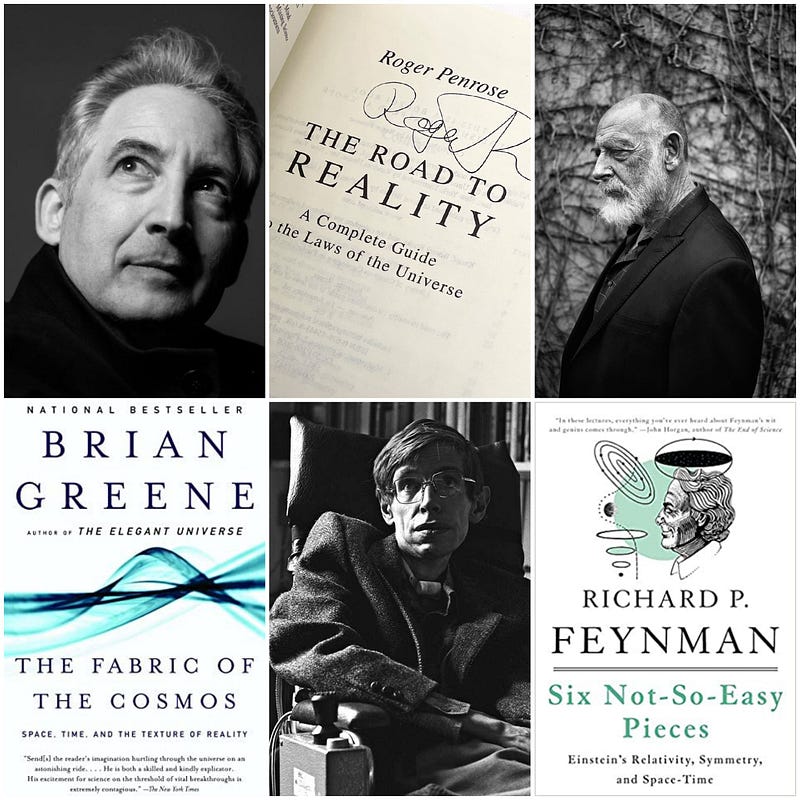# Essential Physics Reads for Every Enthusiast's Library
Written on
Chapter 1: Recommended Physics Literature
The following compilation features a selection of some of the most acclaimed physics books that have emerged over the years. This diverse array of literature spans various physics topics and is authored by some of the most distinguished figures in the physical sciences. The selection criteria for this list include the work's significance, the clarity of its writing, and its overall reputation.
These titles have garnered acclaim from both professionals and general readers for their skill in making intricate concepts accessible and for their significant contributions to our comprehension of the universe. These books are categorized as "popular science" texts, meaning they avoid excessive technicality or advanced mathematics (with the exception of The Feynman Lectures, which contains undergraduate-level math, and The Road to Reality by Roger Penrose). They are approachable for anyone possessing a basic understanding of physics and mathematics. Alongside book titles, their authors, and a notable quote from each, I will provide links to purchase them. Please note that this is not a promotional piece, but rather a personal endorsement based on my reading experience.

“The Feynman Lectures on Physics” by Richard Feynman
This iconic work comprises a series of lectures Feynman presented to undergraduates at Caltech during the 1960s. It encompasses a variety of physics topics, including classical mechanics, electromagnetism, and quantum mechanics, celebrated for its engaging and lucid style.
"Nature uses only the longest threads to weave her patterns so that each small piece of her fabric reveals the organization of the entire tapestry."
“A Brief History of Time” by Stephen Hawking
This book serves as a popular introduction to fundamental physics concepts, including time, the big bang theory, and black holes. Authored by one of the leading cosmologists, it is recognized for its clarity and ability to render complex ideas comprehensible to a broad audience.
"If we do discover a complete theory, it should be in time understandable in broad principle by everyone, not just a few scientists..."
“The Elegant Universe” by Brian Greene
Greene explores string theory, a theoretical framework designed to elucidate the fundamental nature of the universe. His writing is both engaging and accessible, making it suitable for readers without extensive physics backgrounds.
"The universe is not only queerer than we suppose, it is queerer than we can suppose."
“The Tao of Physics” by Fritjof Capra
This text investigates the connections between modern physics and Eastern philosophies, such as Taoism and Buddhism. Capra suggests that insights from contemporary physics can enhance our understanding of ancient wisdom.
"The timeless patterns of the cosmic dance are revealed by the behavior of particles and forces at the atomic and subatomic level..."
“The Road to Reality” by Roger Penrose
This comprehensive work delves into fundamental principles of physics, including quantum mechanics and relativity. Written in a somewhat technical style, it targets readers with a solid background in physics or mathematics.
"The universe is not only stranger than we imagine, it is stranger than we can imagine."
“The Fabric of the Cosmos” by Brian Greene
This book examines the essence of the universe, discussing space, time, and reality's structure. Greene employs various examples and illustrations to clarify intricate concepts and highlight connections within physics.
"The universe is made not of particles but of the relationships between them."
“The Universe in a Nutshell” by Stephen Hawking
This succinct work offers an accessible introduction to fundamental physics concepts, such as the nature of space, time, and black holes.
"The universe doesn’t allow perfection."
“The Cosmic Landscape” by Leonard Susskind
Susskind explores string theory and its implications for understanding the universe's fundamental nature. This technical text is intended for those with a strong grasp of physics or mathematics.
"The most important thing to understand is that the universe is made of strings, and strings are made of the universe."
“Six Not-So-Easy Pieces” by Richard Feynman
This collection of Feynman's lectures introduces core principles of physics and further investigates various topics, including light and wave-particle duality.
"It is a good thing to learn to be self-sufficient, to learn how to do things for yourself..."
“The Grand Design” by Stephen Hawking
This book tackles fundamental inquiries about the universe, including its nature, the concept of time, and its origins. It covers a range of physics topics while discussing key principles and their applications in understanding reality.
"Because there is a law such as gravity, the universe can and will create itself from nothing..."
Thank you for taking the time to read this! If you found this information helpful, please consider showing your appreciation. If you enjoy my writing and wish to support my work, you can become a Medium member or buy me a coffee. Stay tuned for more insightful content!